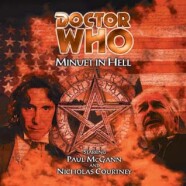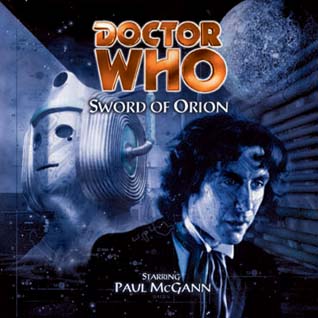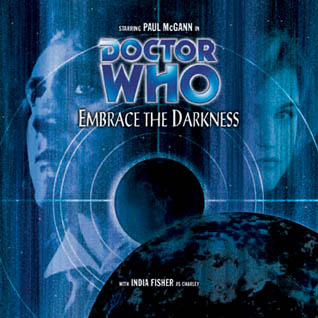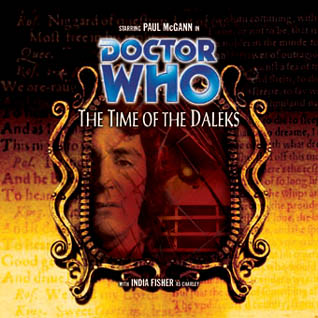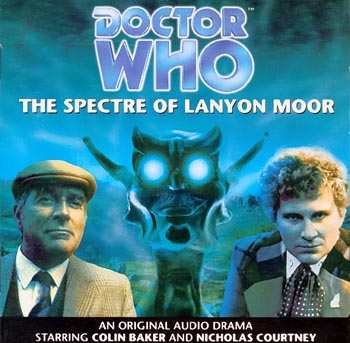Review – Big Finish Doctor Who #19: “Minuet in Hell”
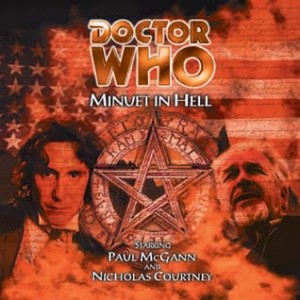 This is the next in line of my Big Finish Productions Doctor Who retro-reviews.
This is the next in line of my Big Finish Productions Doctor Who retro-reviews.
#19 – “Minuet in Hellâ€Â
From Big Finish’s site:
The twenty-first century has just begun, and Malebolgia is enjoying its status as the newest state in America. After his successful involvement with Scotland’s devolution, Brigadier Alistair Gordon Lethbridge-Stewart has been invited over to Malebolgia to offer some of his experiences and expertise.
There he encounters the charismatic Brigham Elisha Dashwood III, an evangelical statesman running for Governor who may not be quite as clean-cut and wholesome as he makes out. One of Dashwood’s other roles in society is as patron of a new medical institute, concentrating on curing the ills of the human mind. One of the patients there interests the Brigadier – someone who claims he travels through space and time in something called a TARDIS.
Charley, however, has more than a few problems of her own. An Amnesiac, she is working as a hostess at the local chapter of the Hell Fire Club, populated by local dignitaries who have summoned forth the demon Marchosias. And the leader of the Club? None other than Dashwood, who seems determined to achieve congressional power by the most malevolent means at his disposal…
Written By: Alan W. Lear and Gary Russell
Directed By: Nicholas Briggs
Cast
Paul McGann (The Doctor); India Fisher (Charley Pollard); Nicholas Courtney (Brigadier Lethbridge-Stewart); Robert Jezek (Brigham Elisha Dashwood III); Morgan Deare (Senator Waldo Pickering); Helen Goldwyn (Becky Lee Kowalczyck / Catatonic Woman); Maureen Oakeley (Dr. Dale Pargeter); Nicholas Briggs (Gideon Crane); Hylton Collins (Orderly); Barnaby Edwards (Scott / Catatonic Man); Alistair Lock (Guard); Jacqueline Rayner (Catatonic Woman); Nicholas Pegg (Catatonic Man)
***minor spoilers ahead***
Nicholas Courtney’s Brigadier meets Paul McGann’s 8th Doctor for the first time!  This story takes place in 2003, but given that anyone hearing it now will obviously listen to it after that date, it’s important to note that it was released in April 2001, and even more important to note the original version of this story was part of the Audio Visuals line from the 80s / 90s, and set in 1762.  Why does this matter?  Because the original story is only about an hour long, and it has clearly been expanded and considerably updated to reflect the new characters, time period, and technologies.  Going back and listening to both of them is a great study in comparison and contrast if you have the means to do so.
The story centers around the character of Dashwood, who is using the Hell Fire Club to channel the very real “demon” Marchosias in a bid for power to become first governor of the 51st state of Malebolgia, a stepping stone in his bid to power for the White House.  When he’s not “politicking,” he’s controlling a team at a mental institution looking to cure extreme cases of insanity using a machine called the Psionic Matrix Facsimile Regenerator, or the PSI-859.  The machine essentially copies over a person’s mental record – memories, emotions, personality, etc. – and digitally stores it so the patient can be lobotomized without affecting any of what makes that person who they are.  When the procedure is done, the digital record is restored on the brain in post-op.  The problem is three-fold.  The first is that the Doctor is one of the conveniently-amnesiac patients in this asylum, and the institute quickly discovers his mental capacity is far higher than a normal human.  The second is that the Brigadier is there to study the machine and the institute as the machine is based on technology originally from Britain.  UNIT wants to be sure such a device isn’t being abused, and they are not interested in the demonic activity the Brigadier reports to them as discoveries are made.  The third is that one of the other patients within the asylum, a Doctor Gideon Crane, reveals that he is the Doctor, complete with the memories of our hero’s many incarnations and knowledge of spacio-temporal physics.
Meanwhile, Charley is rounded up by the local police as a vagrant and put to work in the Hell Fire Club as a “Pretty Little Satin Bottom,” essentially a club hostess / sex slave.  There she meets Becky Lee, who is conveniently the granddaughter of Dashwood’s political rival, Senator Waldo Pickering, as well as the latest recruit of an ancient order designed to fight supernatural threats in the name of St. Peter.
If the setup seems absurd, it’s because it is, and it gets more absurd as the story progresses.  Let’s face it, that’s what Doctor Who is all about.  If you’re reading this, chances are you’re rolling your eyes because you know this to be axiom in the Whoniverse.  Here’s the thing.  In both the original Audio Visuals version and in this new Big Finish, the presentation is what saves the setup, as in the finest tradition of any Doctor Who.  Having said that… the Audio Visuals version is decidedly better.  Being half as long and taking place in Britain, it’s a much more believable presentation.  I am from Dallas, and I’ve lived in the American Bible Belt for most of my life, and if there’s one thing that’s even more obnoxious than Americans faking bad British accents, it’s the British faking bad American accents.  Worse still, the so-called proper “Southern” accent is pretty much the worst offending accent on the planet to begin with, especially when coupled with politics and religion, so faking it takes this story from believable to accidental parody.  Even worse than the badly faked accents?  The demon.  Then you combine all this with the idea of the Hell Fire Club, which really isn’t as much of a stretch as you may think given the nature of Deep South politics and religion, and it just becomes groan-worthy.  Sadly, much of how I’d mock the things in this episode can’t be translated to the written word, but you can find pretty much everything you need to know by tuning into a Sunday morning telecast of one of the local megachurches.  It’s so on-the-nose accurate that it’s certain to offend as many American Southerners as it is to make them laugh for all the wrong reasons.  I hate to say that about Big Finish, especially since the story itself is actually pretty good, but this is just one instance where the voice talent actually kills what might otherwise have been a genius setup.  I’d love to hear Big Finish re-do the original version of this story using the same talent with their natural accents.  The downside to that idea is that you wouldn’t have the Brigadier, and in the wake of Nicholas Courtney’s passing, it’s good to have him around wherever possible.  He’s the shining light of this story, no question about it.
Of particular amusement will be the technology of the time.  It’s hard not to grin when you hear the Brigadier send an email, and the sound effect is that of an old style modem.  Or when they mention a VCR.  Or my personal favorite, the “mega-gig CD-ROM,” whatever that’s supposed to be.
Bottom line: if you’re skipping around and looking for the best of the best, skip this one.  If you do listen, it’s still worth it as, like I say, it’s a good story.  As I’ve said on a number of occasions, Big Finish’s “bombs” are still better than most of what they’re releasing to the TV these days.  But it’s more fascinating to compare this one to the Audio Visuals original than to hear it on its own.

